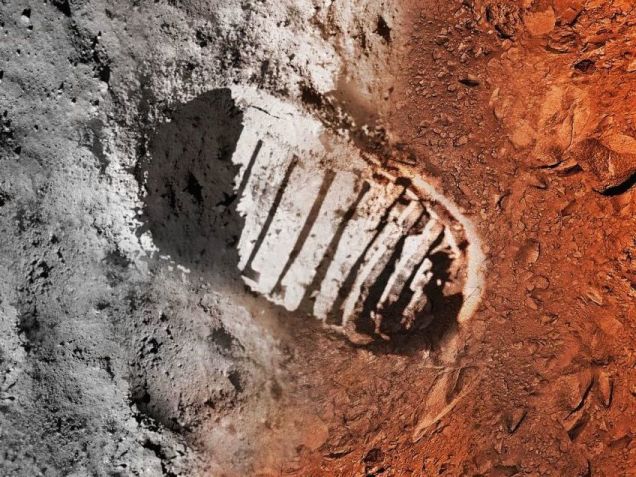
http://space.io9.com/obama-dreams-of-space-but-wheres-the-money-for-a-mars-1680810783/+AnnaleeNewitz
During the State of the Union address, President Obama said stirring things about human spaceflight and the future. But these are the same dreams we've been talking about for years, and without more funding for NASA these dreams will fizzle instead of coming true.
Top Image: The Next Big Leap will bring humans to Mars. Credit: NASA
The key quote from Obama's 2015 State of the Union is:
I want Americans to win the race for the kinds of discoveries that unleash new jobs – converting sunlight into liquid fuel; creating revolutionary prosthetics, so that a veteran who gave his arms for his country can play catch with his kid; pushing out into the Solar System not just to visit, but to stay. Last month, we launched a new spacecraft as part of a re-energized space program that will send American astronauts to Mars. In two months, to prepare us for those missions, Scott Kelly will begin a year-long stay in space. Good luck, Captain – and make sure to Instagram it.
That sounds awesome — real astronauts on Mars, finally joining all our robotic explorers? Be still my beating heart! But at its core, this is nothing different from the big dreams NASA has been advocating for years, dreams that won't come true unless we step up with more funding to make them happen.
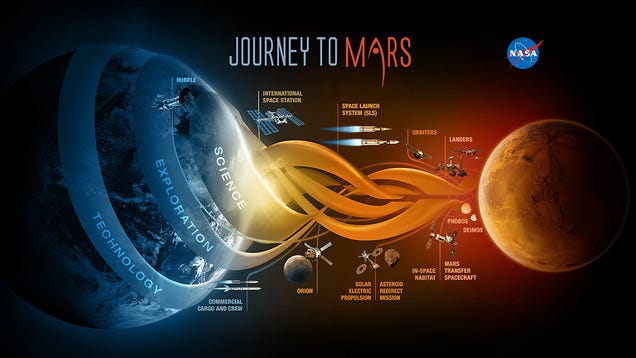
While the Orion spacecraft had a successful first test flight in December, the Space Launch System (SLS) that will launch it into deep space is still a design with repurposed engines undergoing system tests. The project is on starvation funding, just barely enough to keep it going and certainly not enough to do it both well and quickly. That means the next test flight for Orion and the first test flight for SLS, isn't until Exploration Mission-1 (EM-1), which is currently scheduled for 2017 (bumped forward from 2018). If it goes perfectly and manages to stick to the schedule, that makes the very earliest crewed test flight, Exploration Mission-2 (EM-2), in 2021, and we haven't decided where that's going yet. It could be a return to the moon, which would be a bit of a dead end, or it could be a human exploration of an asteroid if we manage to capture one and bring it back to lunar orbit by then. Assuming all that goes well, then the dream is to send astronauts to Mars by the 2030s.
In the meantime, we need to understand what it means to leave people in space for that long. While the International Space Station has a human crew constantly in orbit, those astronauts stay for just six months before coming home. Starting this year, NASA is sending astronaut Scott Kelly into orbit for a full year. His twin (and retired fellow astronaut) Mark Kelly will be staying here on the surface, allowing for the closest thing to a control as we can manage with complicated, messy humans. The Russian space program will be sending cosmonaut Mikhail Kornienko to the station at the same time as Kelly, providing another datapoint. (That neither agency is sending females into space for similar long-duration experiments should be of no concern because clearly females and males exhibit no biological differences, right?) While this isn't an exact replica of what would happen during the journey to Mars — the International Space Station is close enough to Earth to be sheltered from the worst radiation — it will hopefully provide some insight into everything from the bone and muscle loss of living in microgravity to the severe boredom of being cooped up in a tin can for months on end.
I love the idea — I'm regularly bouncing about every bit of exploration and discovery we do in space, and I'm optimistic enough to call a crash landing a failure close enough to success to be worth celebrating — but if Congress keeps NASA's funding as puny as it has been, it's going to stay just that: an idea. After decades of admittedly cool robotic explorers but overall modest ambitions, NASA is daring to dream big. If we want to see those dreams come true, we need to give them more money.
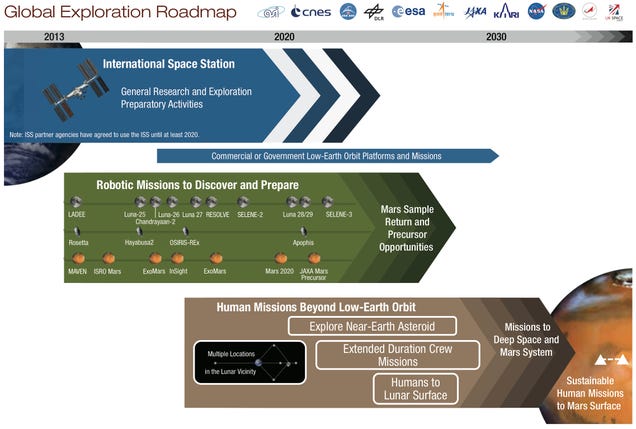
Last summer, the National Research Council (NRC) released a 286-page report [free download after login] of their independent analysis of NASA's prospects of pulling off the big dream of a human presence on Mars by the 2030s or even the 2050s. While the whole report is excellent, this key quote bluntly lays out the funding problem:
However, to set course on such an endeavor, the nation will need its investment in the human spaceflight program to grow annually over the coming decades. To continue on the present course—pursuit of an exploration system to go beyond low Earth orbit (LEO) while simultaneously operating the ISS through the middle of the next decade as the major partner, all under a budget profile that fails even to keep pace with inflation—is to invite failure, disillusionment, and the loss of the longstanding international perception that human spaceflight is something the United States does best.
If we want to do this, we need to shell out the cash to make it happen. Innovation isn't cheap, rocket science isn't easy, and we already have commitments here in Low Earth Orbit and around the solar system that we need to keep funding.
When analyzing NASA's future if they're stuck with a budget that only keeps pace with inflation, the NRC report forecasts a grim future where we never achieve our goals:
The scenario shown in Figure 1.11 was generated to conduct a technical analysis and affordability assessment of a notional pathway to Mars, with a human spaceflight budget that increases at or about the rate of inflation, while also ... including targets that provide intermediate accomplishments and minimize the use of systems that do not contribute to achieving the horizon goal. Astronauts would explore new destinations at a steady pace: operation at L2 is achieved in 2024, a rendezvous with an asteroid in its native orbit in 2028, and the lunar sortie in 2033. Continuing, a lunar outpost would be constructed in 2036, and the martian moons would be reached in 2043. Humans would land on Mars at the midpoint of the 21st century.
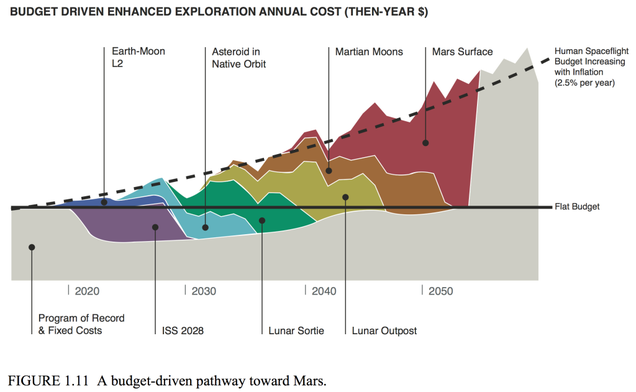
Even worse, the inflation-only funding would allow such a skimpy flight schedule that we'd be unable to maintain proficiency between missions: a crewed mission on average every 2.1 years, but with gaps as long as 5 years in between. Increasing the flight rate to ensure that crews remember how to do everything costs more.
What if we do up the budget allocated to space programs to grow at just two times the rate of inflation? From the NRC report, their analysis is that it could be enough to get humans to Mars, but not by the 2030s:
Assuming the ISS [International Space Station] is extended to 2028 and the HSF [human spaceflight] budget is increased up to 5 percent per year (two times the rate of inflation), the earliest a crewed surface mission to Mars is likely to occur will be approximately 2040 to 2050. Again, these dates are likely to be optimistic because delays will inevitably occur as developmental challenges and potential failures delay the specific pathway schedule and modify its design. If the exploration budget grows at 5 percent per year, the benefit of terminating the ISS in 2020 is not that great from an affordability perspective, in that a human landing on Mars may be accelerated by just 2 to 4 years, depending on the pathway and the associated risk.
This scenario is far better. It's not perfect, but I could handle a few decades schedule-slip if it meant we actually got humans on the surface of the red planet, and a funding increase at twice the rate of inflation is just modest enough to be conceivable in the current economical and political climate. It'll take money, but it really isn't that much money in the context how we allocate the American budget. Plus, we'd get to keep the International Space Station, the constant beacon of humans in space sharing their joy of discovery with us.
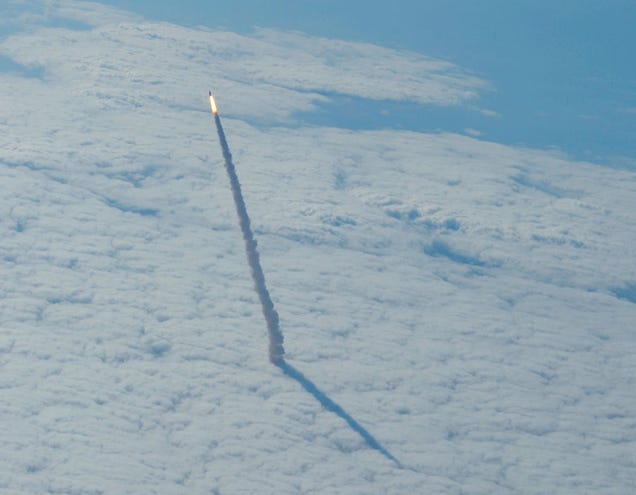
Is sending humans to Mars worth the money, the fuss, and the risk? Yes, yes, a million times, YES!
Aside from the romance of exploration, establishing a permanent human settlement on Mars would go a long way to alleviating the "all your eggs in one basket" approach to survival we have going on right now. While I'm perpetually irritated by media hype over not-so-near misses by asteroids, it is pretty much inevitable that we're going to get smacked by something massive from space eventually. Our current status of even monitoring incoming space hazards is so abysmal that a group of astronauts were so frustrated they started a foundation specifically to fill the gap. Even if we did see something, we don't currently have the technology to do anything to prevent our looming demise.
Beyond pragmatism, human exploration also serves a scientific function. Exploring other planets is the only way to practice comparative planetary science, and will inevitably lead to better understanding of the atmospheric science, geology, and geomorphology back here on Earth. While our robotic explorers are crush-worthy and the Mars 2020 rover has tools that make my geophysicist heart pitter-patter with excitement, some science is really best done by humans. No time lag, ultimate flexibility, endless innovation — despite the strides made by our robotic overlords, humans are still better at some things.
Even just learning how to function in a closed environment with limited resources will teach us about how to best protect our environment here on Earth, or even help it recover to a more stable equilibrium. It's expensive to get into space: the most economical possible way to function in a space colony involves embracing Reduce, Reuse, Recycle to the fullest extent. By helping our deep space colonists, we'll make life better for ourselves here at home.
If all that doesn't strike you as a good enough reason, being the first to send humans to Mars would reestablish the United States as a powerful force on the international stage. The moon landings were amazing, but the space race is heating back up. Right now, a Chinese satellite is in orbit around the moon, an Indian satellite is in orbit around Mars, a European satellite is in orbit around a comet with a lander on its surface, and Russia is providing the only human transport to and from the space station. The American space programs — commercial and public — are phenomenal, but they aren't the only game in town. I'm not all that much for nationalism, but if a healthy dose of competition will get this project funded, I'll do my best to wave some flags and yell encouraging things.
Beyond all of that, innovation drives innovation. We couldn't have predicted all the awesome toys and tools we got out of the Apollo project. Even now, the need to run cargo and crew to the space station is supporting a thriving commercial space program, while discoveries on that station are being spun into commercial ventures. I have no idea what innovations would come out of a concerted effort to leave this planet for human deep space exploration, but I know it'd be amazing.
Why am I pushing so hard for us to fund NASA to do this when private companies are also gnashing at the bit to go exploring? Partly it's because exploration and innovation and hugely risky and I just don't see a Mars mission being profitable or commercially feasible in a relatively short timeframe. If I'm wrong about that and space tourism and resource extraction are going to get off this planet far faster than any public effort, I'm going to be a wee bit sad. Pragmatically, I'm a scientist and a science journalist, so having everything be automatically in the public domain gets me giddy. But my real reason is purely romantic: I want to believe we can come together for the public good, to work together not for individual gain but for the advancement of our species. I want the first humans on Mars to be going as representatives of the planet, not whomever could afford the most expensive ticket.
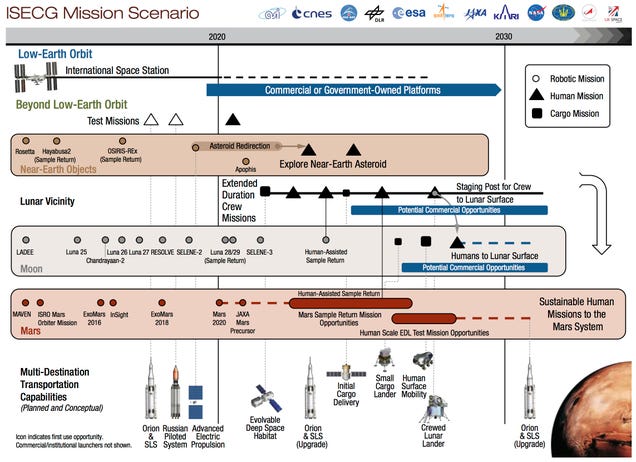
I want to see us leave this planet, to go beyond Low Earth Orbit and truly live on our solar system. I want these visions of humans in deep space to be a reality one day. I want to know that astronauts of the future will be able to do more than drift around in the International Space Station, to extend our presence farther from home. I want the Global Exploration Roadmap to be an actual map of our future activities. But if we want to do that, if this is going to be a priority, the lesson from NRC is clear: if we want to get beyond our planet and send humans to deep space, we'll need more money to do it:
Based on the lessons from these and other scenarios... the committee has concluded:
As long as flat NASA human spaceflight budgets are continued, NASA will be unable to conduct any human space exploration programs beyond cislunar space. The only pathways that successfully land humans on the surface of Mars require spending to rise above inflation for an extended period.
We're living in a Space Age. It's time to stop resting on our past accomplishments and work for a spectacular future. NASA got us started with big dreams, President Obama spent part of the State of the Union pumping us up, now let's boost that budget and go to Mars! Even if we have to invent a new political party to make it happen.
Thoughts?
